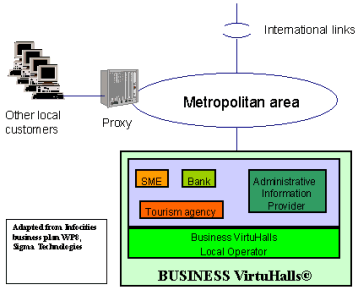
"Market Place"
Market Place is the old name of the application from work package 8 in the feasibility phase of Infocities. Electronic Commerce encompasses a broad range of activities. The core component is addressing the commercial transaction cycle. Electronic Commerce includes electronic trading of physical goods and services and of electronic material. Upstream and downstream of the transactions also includes advertising and promotion of products and services, facilitation of contacts between traders, provision of market intelligence, pre- and post-sales support, electronic procurement and support for shared business processes. Market Place is a virtual place to support local and regional companies in the deployment of Electronic commerce applications covering any form of business transaction that is conducted electronically, using telecommunications networks. Such transactions will occur between companies themselves and between companies and their customers:
- Business-to-consumers Internet shopping sites
- Business-to-business application and services
Access to the information is at least via telephone modem and ISDN. Kiosks are not popular here. Only one third of applications use kiosks.
"Market Place" applications are often fully functional on open (Web) sites, with no specific access criteria. But a majority uses some kind of password access. The financial returns are mostly organised via bundling of Market Place with other contracts. In a later report of VirtuHalls we will get back to this, to explain what it means. Payments are based on direct links to banking tokens and indirect links to banks (f.e. domiciliations, but a direct link to the service can be organised). Hi-tech applications are online to serve as Market Place. Check it out. Read the evidence reports for more about the technology we deployed.
There are recurring tasks, but they are not reported to be automated by intelligent agents. User-feedback can be acquired. User-profiling is only an option in one third of the cases, which is surprising, since returning interactive citizens might like the comfort of being recognised by the system.
The trans-european consulting of information across cities is possible. The "Market Place" can be migrated and instanced in another City and used through several access cases. No ancillary providers are foreseen, besides the current providers.
"Interactive Culture Plaza"
Interactive Culture Plaza is based on the work in work package 7 in the feasibility phase of Infocities. The "Interactive Culture Plaza" is a modular approach to a virtual environment for the promotion of (parts of) cities or regions. Its target is to show to tourists what the city or region is about. Why should they visit this city or region? What is happening in the city or region? What are the main attractions? The product "Interactive Culture Plaza" has modules that do not only allow promotion to non-residents, but information for residents also. Where the promotion to non-residents is an Internet service, the information for residents can for example be on teletext. It aims to bring the atmosphere of the city of region to the (computer/TV) screen. Finally there are modules that support tourists on-site in the city. This includes the application of 3D User Interfaces (including 3D audio and GPS wearable guides).Like the Municipal VirtuHalls also the Interactive Culture Plaza channel typically concerns information and communication facilities for citizens. Surprisingly only 40% of applications deal with transaction facilities. SMEs are targeted as suppliers of content. Civil servants are probably targeted because they are often involved in the cultural heritage of cities.
Access to the information is at least via telephone modem, ISDN and kiosks. "Interactive Cultural Plaza" applications are fully functional on open (Web) sites, with no specific access criteria. The information is free. The information is presented in various ways. HTML is the common denominator, but techniques ranging from PDF to even streaming video are used. Check it out. Read the evidence reports for more about the technology we deployed.
Recurring tasks do not play an important role. User-feedback can be acquired. User-profiling is an option, which is logical since returning interactive citizens would like the comfort of being recognised by the system.
The trans-european consulting of information across cities is possible. The "Interactive Culture Plaza" can be migrated and instanced in another City and used through several access cases. No ancillary providers are foreseen, besides the current providers.
